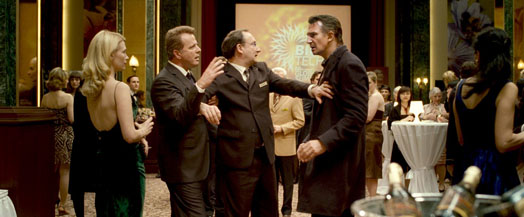Things I Learned From Movie X: Unknown
By Edwin Davies
March 8, 2012
BoxOfficeProphets.com

As surprising as his sudden change in career may have been, it was nothing compared to how quickly Neeson went from starring in high-quality crap like Taken to middling, barely straight-to-DVD quality fare like Unknown, in which he plays a world renowned botanist who gets involved in a car crash whilst in Berlin for a conference, then wakes up to discover that no one seems to know who he is and he has no proof that he is who he says he is, either. With the help of the cab driver who first endangered then saved his life (played by the ever delightful Diane Kruger) and a former Stasi agent turned detective (played by Bruno Ganz who, thanks to YouTube, now has the dubious honour of having supplanted the actual Hitler in the popular consciousness), he starts to piece together the puzzle and discovers that he is a character in a film that is not very good. Yet just as new life can rise from manure, so can important lessons rise from the fertile loam of a bad film. Observe...
Isn’t Berlin a nice looking city?
You know that a film is in trouble when the shots of the city it is set in are more interesting than the plot, but Unknown falls into that particular trap by being set in Berlin, which looks just lovely all covered in snow, albeit in a really bleak way. (Then again, the plot of the film is so uninvolving that the film could have been set in Branson, Missouri and the backdrop would have still been more interesting.)
The setting also allows the film to indulge in some delightfully subtle racial stereotyping, which I always find interesting since seeing how close a film can get to being racist without actually being racist is a fun, if weird, game to play. In this instance, the film depicts all Germans as fastidious followers of protocol who are completely humourless, and who spend all their time either getting in the way of the forthright Dr Martin Harris, trusting Google search results over the pleas of a real human being. The only ones who don’t seem to be slaves to their programming are the fun loving Euro-trash types that Martin encounters when he and Gina (Kruger) hide out in an underground club to escape from the mysterious agents who seem intent on killing them. It was here that I hoped that the film would take a strange detour, and that the strains of New Order’s Blue Monday would cause Martin to discover a hitherto unknown love of dance music, at which point he would forget about the men trying to kill him and throw shapes in the house of dance to his heart’s content. Sadly, it was not to be, and the film soon returns to the business of guns, car chases and talk of plants. Oh, how I mourn for the film that may have been, of a man in his 50s who finally discovers that what has really been missing from his life was MDMA and a beat.
A good villain is a terrible thing to waste
Okay, I’m going to leap straight into spoilers here, so don’t read on if you don’t want to know how silly Unknown really is.
About two-thirds of the way through the movie, we learn from Frank Langella, who shows up saying that he is an old friend of Martin’s but who is really the head of an elite group of assassins, that Martin Harris is actually not a real person, but a persona that Neeson’s created in order to infiltrate the conference he was meant to attend and plant a bomb that would kill the inventor of a new kind of super-corn that could end world hunger. (The team of assassins having apparently been hired by the nefarious agents of Big Corn, which sounds like the worst name for an evil cadre of industrialists or ‘70s era pimp ever.) The concussion that “Martin” sustained in his accident caused him to confuse his cover for his real life, which at least explains why a botanist has great fighting and mad defensive driving skills, and meant that the assassins had to bring in a replacement to complete Martin’s mission.
This is all revealed in what proves to be Langella’s third and final scene in the movie, after which he is killed off rather weakly when Gina uses a stolen taxi to ram his van off the third story of a car park. The reason why this is such a major problem for the film is that Langella manages to fill more menace and danger into his five minutes of screen time than any of the other bad guys in the film manage with four or five times that, despite at no point actually doing anything threatening. He never uses a gun, he never fights anyone, all he does is stand and talk in that half-soothing, half-terrifying way that he does. He’s exactly what the film had been missing up until that point, and the filmmakers decide that the logical thing to do with the one palpable threat in the whole film is shove him off a tall building 20 minutes from the end. Considering that leaves the film with January Jones as the main antagonist, and considering that she has a hard enough time acting like a human, let alone one with duplicitous ends, it leaves the final act of the film decidedly lacking in any real interest. Then again, the film even does her a disservice by having her die when she fails to deactivate a bomb she helped set up in the first place. There’s dispensing justice to the bad guys in a satisfactory manner, then there’s just killing them so you don’t have to write too many scenes for them.